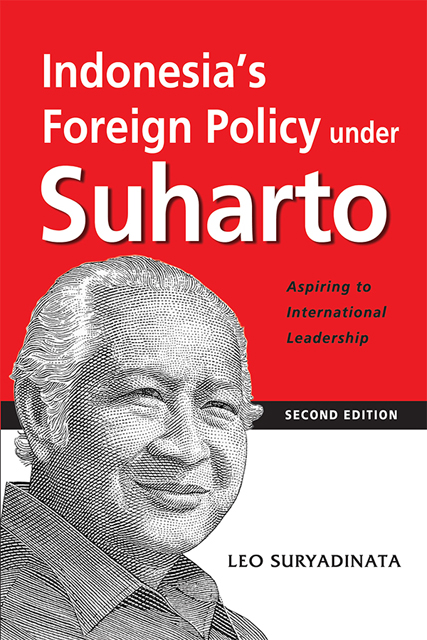Book contents
- Frontmatter
- Contents
- Preface to the Second Edition
- Preface
- Acknowledgements
- Introduction: Suharto’s Foreign Policy
- 1 Determinants of Indonesia’s Foreign Policy: In Search of an Explanation
- 2 Indonesia’s Foreign Policy before the New Order: In Search of a Format
- 3 Indonesia’s Foreign Policy during the “New Order” (I): The Rise of the Military
- 4 Indonesia’s Foreign Policy during the “New Order” (II): The Assertive Role of the President
- 5 Indonesia’s Relations with the ASEAN States: Regional Stability and Leadership Role
- 6 Indonesia’s Relations with Australia and Papua New Guinea: Security and Cultural Issues
- 7 Indonesia-China Relations: Ideology, Ethnic Chinese and the President
- 8 Indonesia-Vietnam Relations and the Kampuchean Issue: The Security Factor
- 9 Indonesia-Superpower Relations: Economic and Non-Economic Factors
- 10 Indonesia, the Middle East and Bosnia: Islam and Foreign Policy
- 11 Indonesia, the Non-Aligned Movement and APEC: In Search of a Leadership Role
- Conclusion: To Lead and Not to Be Led
- Postscript: Indonesia’s Foreign Policy from the Fall of Suharto to Joko Widodo: Still Aspiring to International Leadership?
- Bibliography
- Appendices
- Index
7 - Indonesia-China Relations: Ideology, Ethnic Chinese and the President
Published online by Cambridge University Press: 01 September 2023
- Frontmatter
- Contents
- Preface to the Second Edition
- Preface
- Acknowledgements
- Introduction: Suharto’s Foreign Policy
- 1 Determinants of Indonesia’s Foreign Policy: In Search of an Explanation
- 2 Indonesia’s Foreign Policy before the New Order: In Search of a Format
- 3 Indonesia’s Foreign Policy during the “New Order” (I): The Rise of the Military
- 4 Indonesia’s Foreign Policy during the “New Order” (II): The Assertive Role of the President
- 5 Indonesia’s Relations with the ASEAN States: Regional Stability and Leadership Role
- 6 Indonesia’s Relations with Australia and Papua New Guinea: Security and Cultural Issues
- 7 Indonesia-China Relations: Ideology, Ethnic Chinese and the President
- 8 Indonesia-Vietnam Relations and the Kampuchean Issue: The Security Factor
- 9 Indonesia-Superpower Relations: Economic and Non-Economic Factors
- 10 Indonesia, the Middle East and Bosnia: Islam and Foreign Policy
- 11 Indonesia, the Non-Aligned Movement and APEC: In Search of a Leadership Role
- Conclusion: To Lead and Not to Be Led
- Postscript: Indonesia’s Foreign Policy from the Fall of Suharto to Joko Widodo: Still Aspiring to International Leadership?
- Bibliography
- Appendices
- Index
Summary
Introduction
This chapter examines Indonesia’s policy towards China under Suharto. It explains why it took so long for Jakarta to normalize relations with Beijing and what obstacles arose in the process. What were the factors that contributed to the diplomatic breakthrough in 1989? What were the roles of the military and the President in this normalization process? Are there any issues which may affect the relations?
Sino-Indonesian Relations under Sukarno
It is a well-known fact that, during Sukarno’s time, Indonesia was on good terms with the PRC, especially in the mid-1960s when Indonesia, together with the PRC, attempted to set up the Conference of New Emerging Forces (CONEFO) headquartered in Jakarta. CONEFO was supposed to be a United Nations of poor countries because at the time, the PRC had not yet been admitted to the UN, and Indonesia had just left the organization. This did not mean, however, that all socio-political forces in Indonesia were in support of close Beijing-Jakarta relations. On the contrary, the army was worried about a Beijing-Jakarta axis but was not able to move Indonesia away from the PRC anti-colonialist coalition.
In the 1960s, prior to the emergence of the New Order, there were three political forces competing for influence in domestic politics. Communist influence continued to grow after the 1957 by-elections and the Army also gained in strength after crushing the 1958 regional rebellions in Sumatra and Sulawesi. The President, who was becoming more left-wing in his political orientation, initially attempted to balance the PKI against the Army and vice-versa, but gradually he moved closer to the PKI. Fearing the rise of the military, the PKI wanted to establish a Fifth Army under its control made up of peasants and workers. Sukarno lent his support to the idea and sent Omar Dhani, the chief of the Air Force, to negotiate with the PRC in the hopes of getting small weapons for the Fifth Force. Apparently, the President wanted to balance the army’s strength by aligning himself with the PKI and the Air Force.
This balance of power game came to a sudden end on 30 September 1965 when an alleged communist coup took place. Six generals were kidnapped and slain, but General Nasution escaped. General Suharto, who was the commander of the Strategic Unit in Jakarta, was not on the list.
- Type
- Chapter
- Information
- Indonesia's Foreign Policy under SuhartoAspiring to International Leadership, pp. 101 - 121Publisher: ISEAS–Yusof Ishak InstituteFirst published in: 2023



